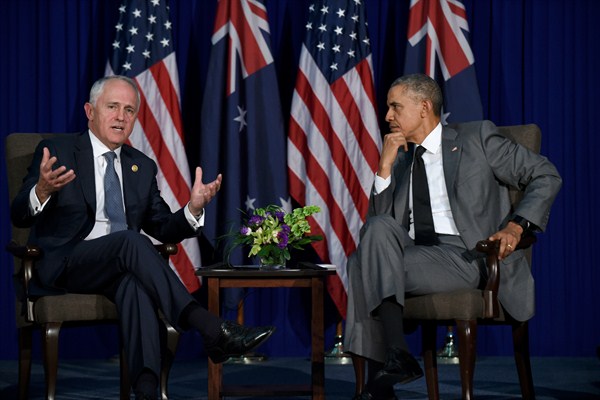The military alliance with the United States has been a cornerstone of Australia’s strategic and defense policy since World War II. Recently, however, signs have emerged that Australia might more carefully weigh its options when it comes to dealing with China, the rising great power in Asia and Australia’s most important trading partner. Last month, only days after the U.S. guided-missile destroyer USS Lassen sailed within 12 nautical miles of an artificial island near Subic Reef in the South China Sea, which is claimed by China, two Australian Anzac class frigates conducted a live-fire exercise with Chinese warships. Moreover, a decision to award a Chinese company, Landbridge, a 99-year lease of the strategically important commercial port in Darwin on Australia’s northern coast triggered considerable domestic criticism, given the company’s close ties with the Chinese government. Finally, some analysts have argued that Australia might find it more difficult to navigate strategically between its longtime ally in the U.S. and an increasingly assertive China.
Yet there is little factual evidence to support the claim that Australia is indeed moving away from its close defense relationship with the U.S. because of China’s growing influence in the Asia-Pacific. Aside from shared values and norms, the U.S.-Australia alliance is a function of cost-benefit calculations by both sides. For Canberra, the major benefits of the U.S. alliance are threefold: the maintenance of a stable, favorable regional security order; U.S. security guarantees against an existential external threat; and preferential access to U.S. military intelligence and weapons technology. In the face of China’s rise, those benefits are of even greater value than before. In fact, the more China contests the order in littoral East Asia, the more Australia is likely seek a closer defense relationship with the United States.
There is bipartisan consensus in Canberra that the U.S. is critical to maintaining and managing a rules-based East Asian security order. Without U.S. leadership, Australian officials fear, the Asia-Pacific could become a much more dangerous place, given shifting power dynamics, unresolved territorial disputes and growing military modernization across the region. That echoes the strong public support among Australians for the U.S. alliance and wariness about China’s future contribution to the regional order.

